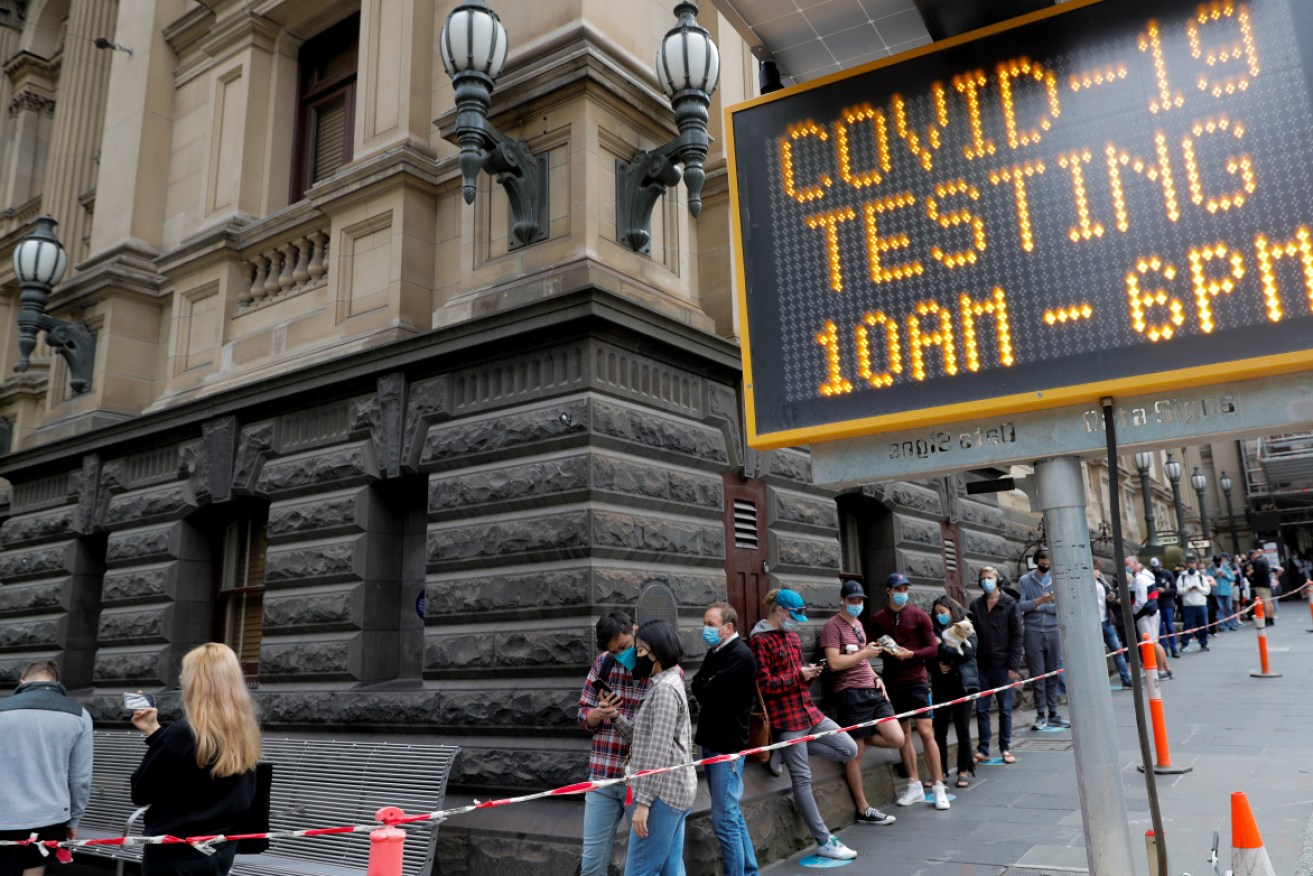Change to COVID testing, contacts, flagged

Victoria has reported 14,020 new cases of COVID-19 and 516 people have been hospitalised. Photo: AAP
The country’s leaders will meet on Thursday to redefine what it means to be a close contact and set out parameters for when rapid antigen tests can be used over PCR ones.
Prime Minister Scott Morrison called an emergency national cabinet, bringing the scheduled meeting forward by a week, with Australia obliterating its previous daily COVID-19 infection record, states struggling with testing capacity and rising hospitalisations.
“We’re going through a gear change when it comes to how we manage testing arrangements, the definition of close contacts, how we furlough staff and isolate people who are impacted by cases,” Mr Morrison told reporters on Wednesday.
The close contact definition that will be presented to national cabinet will set the threshold at four hours of contact with a positive case within a household environment.
“We just can’t have everybody taken out of circulation because they just happen to be in a particular place at a particular time,” Mr Morrison said.
Chief medical officer Paul Kelly would not elaborate on how a decision on the threshold was reached when asked if the virus’ transmissibility would put people together for shorter intervals in enclosed environments at risk.
“The important principle here is we need to focus on where the biggest risk is,” Professor Kelly said.
“(In) almost every jurisdiction we’ve seen a long wait for people to get their results. Frankly, if you have to wait for eight hours in a queue and then 72 to 96 hours to get a result. It’s not fulfilling any useful public health function and it’s delaying proper clinical care.”
Changes to how close contacts are identified and managed will be underpinned by changes to the current testing regime, pivoting from heavy reliance on PCR to rapid antigen tests.
Mr Morrison said changes to how close contacts are handled would mean there would be a seven day quarantine period which would end if the person posts a negative rapid antigen test on day six.
A second rapid antigen test would then be taken on day 12.
Mr Morrison said the federal government is working on a funding arrangement with the states to provide rapid antigen tests for free but states would remain in charge of the rollout in the same way it has for when PCR tests are required.
“In other casual settings, it’s a matter of going off to the chemist,” he said.
But Mr Morrison remained coy on whether the rapid tests would be subsidised or given out for free to people who couldn’t afford to purchase them off shelves.
“The treasurer and I are discussing … concessional access in the private market,” he said.
“When you start providing tests through other methods, you need to be very clear about where and who.”
Both NSW and Victoria have ordered millions of the tests and already promised to provide them for free, but they won’t be available until the end of January.
Labor leader Anthony Albanese accused the prime minister of passing the buck on testing to the states, saying it revealed a lack of leadership.
“We have the NSW government trying to purchase rapid antigen test that will be available, wait for it, at the end of January, when we have a crisis right now,” he said.
“We have businesses that are unable to open. We have people that are waiting day after day after day to get the results of the tests and we have some people who simply can’t get tested so they are just staying isolated.”
The changes come as states continue to report record numbers of cases, with well over 18,000 around the country.
Some 11,201 new cases were reported in NSW on Wednesday, almost double the state’s previous record and just 53 short of the number recorded nationwide on Tuesday.
It’s a similar story in Victoria, where the number of cases jumped by 1029 to a record 3767.
Five deaths were reported in Victoria, and three in NSW.
There were 1589 cases in Queensland, 1471 in South Australia, 138 in the ACT, 55 in Tasmania, 19 in the Northern Territory and two in Western Australia.
– AAP








